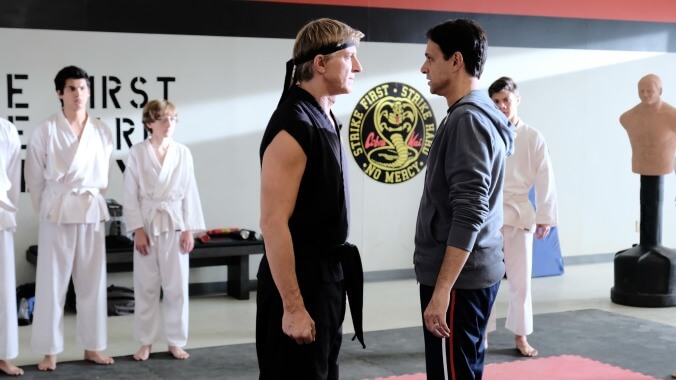Cobra Kai karate-chops into season 2 with half the humor and double the melodrama


A big part of what made season one of YouTube’s Cobra Kai a surprising success was how honest and funny it was about the aggrieved white-male pettiness at the center of its two charismatic leads. Picking up a now 25-years-later narrative from the plot of the original Karate Kid movie seemed like a tired concept powered solely by nostalgia, but the series quickly demonstrated a flair for harsh and unsparing assessments of the middle-aged men resuming a decades-old rivalry. William Zabka’s Johnny Lawrence was a casually sexist and racist asshole who believed the world owed him something, only to stumble into a chance to evolve by opening a dojo where he swore to not repeat the mistakes he felt had led him astray as a kid. Daniel LaRusso (Ralph Macchio) was the kind of casually overconfident success story whose do-gooder mindset masked some deep insecurities. And the series found heart and humor in their fumbling attempts to do the right things.
So what happened between seasons one and two? Gone is much of the incisive and self-aware comedy that kept this series from falling wholly into overblown melodrama. It’s not until the second-to-last episode that anything approaching the goofball charm and wit of its freshman season arrives, and by then the entire narrative is so weighed down with the baggage of its sudsy dramatics that the show feels less like a witty relaunch of a beloved film, and more like a 2019 version of Beverly Hills, 90210 (but not, you know, the 2019 version of Beverly Hills, 90210), complete with hokey music sequences and soap opera-level plotting. Put it this way: The second episode has a montage of Daniel and his wife selling 10 cars in one day at their auto dealership, and it wants you to find it really badass.
Season two picks up seconds after the first one concluded, with Johnny’s student Miguel (Xolo Maridueña) fighting dirty against Daniel’s protégé (and Johnny’s son) Robby (Tanner Buchanan) in order to win the All-Valley karate tournament. Johnny’s former mentor John Kreese (Martin Kove) returns to ask for a chance helping Johnny craft the new generation of Cobra Kai students, while Daniel decides to get into the dojo business himself, attempting to one-up Cobra Kai by offering free karate lessons to all comers at his own “Miyagi-do” backyard dojo. Meanwhile, the LaRussos’ daughter, Sam (Mary Mouser), begins Miyagi-do training with Robby while Miguel, Hawk, and the other Cobras enter a new era of growth and competition against the new dojo in town and its burgeoning ranks. In short, what used to be a personal rivalry between two men who can’t leave well enough alone is now a full-blown fracture between teenage karate cliques.
It’s almost as though the whole series has fallen victim to the same mentality as Hawk (Jacob Bertrand), the former nerd turned Cobra Kai bully who takes Johnny’s mantra about the importance of always being “badass” a little too much to heart. Whereas before a slo-mo sequence of Johnny refurbishing his old Dodge Challenger—emblazoning it with the Cobra Kai logo then roaring down the road with Miguel as the two of them wear sunglasses and attempt to show off in front of girls—would have smartly noted the absurdity of Johnny’s outdated macho swagger, now it expects us to find it cool. So goes much of the show: What was formerly self-aware now comes across as overwrought and self-important, like the cheesy metal riffs that signal the arrival of nearly every significant moment. At one point, a cement mixer pulls up in front of the Cobra Kai students as part of Johnny’s dangerously ill-considered lesson plan, and the camera lingers and the music swells instead of dropping out, as though it should be a moment of awestruck appreciation rather than arch scorn at the proceedings.
Indeed, nearly everything complicated about Johnny has now been (mostly) redeemed, the character less of an interesting and identifiable mix of toxic masculinity and broken dreams than he is a lovable curmudgeon who still grouses about kids these days. (The third episode literally has him try to set up a new internet connection for his laptop, only to blankly ask, “What’s wi-fi?” as though he had been living under a rock for 20 years instead of under a fog.) The show has shifted the truly noxious attitudes over to his former mentor, Kreese, asking Johnny for a second chance even as he questions his approach. While it occasionally gives Kreese hints of depth, he’s mostly a sentient Machiavellian sneer, there to push Johnny toward his worst instincts. And although Daniel’s arc is the more engaging one this time around (his commitment to professionally teaching karate immediately intrudes on his work life and his marriage, prompting wife Amanda to sensibly ask, “Is this a midlife crisis?”), the series no longer finds much humor in anything the auto dealer says or does, instead pivoting from his wannabe-inspirational speeches to unjustified plot goosing whenever it needs him to do something dumb to continue the escalating rivalry.
And the kids, who used to be the ones breathing the sensible air on the show, are now embroiled in the same soapy theatrics as any other teen-centric drama, only without much in the way of subtlety. What were once ironic and witty gestures toward ’80s-style imagery and editing are now the norm, with nothing to distinguish it from the hokey forebears it shamelessly apes. The supporting characters veer between one-note comic relief and sneering cartoon villainy, like new tomboy Tory (Peyton List) preening like an assemblage of action-movie quips and playing the stereotypical bad girl to the hilt. Themes are overtly stated by characters as though they were reading them off writers room whiteboards, and the heightened reality is never questioned, only encouraged by the staging, editing, and sound mix. By the time a deadly-serious struggle between two kids begins with one of them ominously intoning, “I saw your Yelp review—take it down,” the viewer might begin to wonder if the angsty teens are also running the show itself.
The disagreements on Cobra Kai used to feel like reasonable issues by two flawed and childish men who had blinded themselves to their faults. Now that assessment applies to nearly every single character, all of whom take turns endlessly speechifying when they’re not listening to someone else monologue. Predictable twists and hoary TV storytelling tropes abound. (When Daniel starts an episode by promising his wife, “Don’t worry, I’ll be there,” guess what happens?) Dialogue is trite and clichéd. The only thing keeping it all afloat is a handful of strong performances, primarily from its adult stars Zabka and Macchio. The series must have been crane-kicked in the head one too many times between seasons, because it has lost all sense of what made it special. It’s repeating the exact same structure as its freshman year, only without the wry self-awareness that this is all a bit ridiculous.